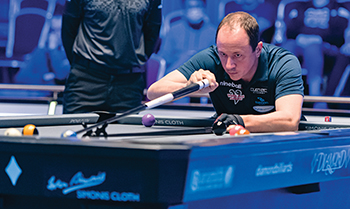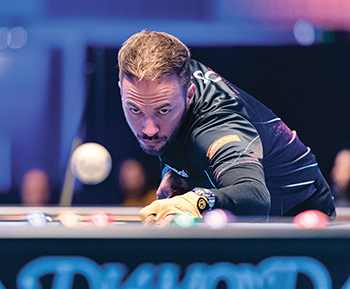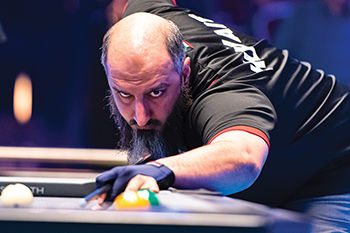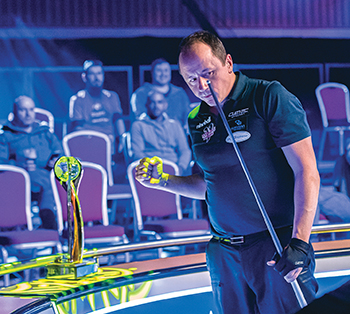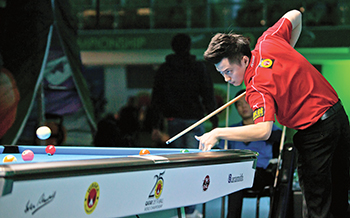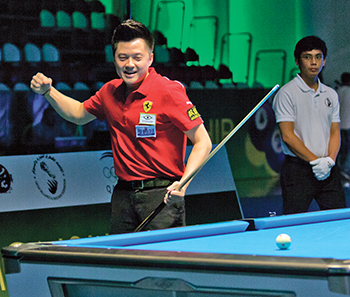No Worlds Left to Conquer
At 38, American Shane Van Boening finally claimed the one title missing from his trophy case — the World Pool Championship.
By Keith Paradise
Photos by Taka Wu
The night before the final day of competition in the World Pool Championship, Shane Van Boening slept like a baby — and maybe that should have been his indication.
“I felt like I slept the best that I ever could before the finals,” said “I just had a feeling that I was going to do well that day.”
Near the end of previous World 9-Ball Championships, Van Boening tossed and turned his way to something that resembled a couple of hours of sleep on paper but wasn’t particularly restful. This time, the 38-year-old American star guesstimated that he grabbed 10 hours of rest before rising for the final two rounds of play Sunday morning at Stadium MK in Milton Keynes, England.
Then again, nothing about this tournament had been going the way it had gone in previous years, so why should rest be any different? Throughout the five-day, 128-competitor event, Van Boening seemed to get just the right break at just the right time — or, as was the case in his round of 16 match against Ko Pin Yi, back-to-back breaks at just the right time. Whenever it seemed a player was about to take command against the South Dakotan, an untimely error would occur. Conversely, whenever Van Boening had a chance to seize on an open opportunity he rose to the occasion and shot more precisely than a Swiss timepiece.
Van Boening said he felt like a new person when he woke up and, by the end of the day, he was definitely a different one; a person who could finally add the title “world champion” as a prefix to his name, having survived a nip-and-tuck battle in the first half of his match with defending champion Albin Ouschan only to have another one of those momentum swinging shots lead to winning eight straight racks and coasting to a 13-6 victory. The World Pool Championship title, a title which had eluded the South Dakotan for a decade and a half, puts an exclamation point on a career that includes five U.S. Open 9-Ball Championships, four Derby City Classic 9-Ball titles, a pair of World Pool Masters crowns and more than a dozen U.S. Open 8-Ball and 10-Ball titles. Even before this championship, the only thing that was keeping him out of the Billiard Congress of America Hall of Fame is the fact that he’s too young, still three years from earning a spot on the ballot.
“I only have one thing left to say,” Van Boening said on the Tuesday after his victory. “That monkey is no longer on my shoulder.”
It was a monkey that had been there for so long and had been fed so often by Van Boening’s detractors that the primate could probably run a couple of balls himself. Sure, they’d say, “He’s won a lot in America but what about his record in world championships?”, completely overlooking the fact that Van Boening was one of the few American competitors at that time willing to challenge himself in international events. In consecutive years, Van Boening lost in the final, losing to Pin Yi Ko in 2015 and to Albin Ouschan the following year. In 2018, he finished third. Even in last year’s World Pool Championship, Van Boening appeared to be cruising along in the single-elimination phase when sparring partner Oliver Szolnoki came from behind to eliminate him in the round of 16. With younger players joining the circuit every year, it was understandable for American pool fans — and even Van Boening himself — to wonder if the window of opportunity was either beginning to close or had already been shut.
Van Boening opened double-elimination play with routine victories against Waleed Majid, 9-4, and Jan Van Lierop, 9-6, but struggled against Bahran Lofty in the opening round of single-elimination play, using a couple of pocketed 9 balls on the break gut out an 11-9, win. And when a resurgent Mika Immonen built a commanding 10-3 advantage in the race-to-11 round of 32, it looked like Van Boening’s chances for a championship would have to wait for another year.
“I thought it was over,” he said. “I was pretty much done.” As Immonen worked to clear the table in what could have been the final game, the 3 and 4 balls remained clustered in a corner. The former World 9-Ball Champion cut in the 3 ball and crisscrossed the cue ball across the table to try and land an angled position on the 4 ball. Instead, he bumped the object ball and left himself a straight-in shot down the rail, eliminating any hope of moving the cue ball to the other side of the table for position on the 5 ball, which Immonen ultimately overcut and missed.
“That’s when I told myself I’m not giving up,” said Van Boening. After a victorious safety exchange allowed him to cut the deficit to 10-4, the South Dakotan used back-to-back breaks and runs to chop the lead to 10-6. He would miss the 3 ball in the 17th rack but watched the cue ball roll to a safe spot, forcing his opponent to try a jump shot. After Immonen missed his attempt, Van Boening cleared the table once again to trim the lead to 10-7.
It seems no championship run in any sport is complete without some form of controversy or point of contention. Pool, with its myriad of breaking and racking rules, is rarely an exception to the rule. After Van Boening broke the balls in the 18th game, the official approached the table to remove the template rack that was being used in the tournament’s earlier rounds. The 9 ball settled near the plastic sheet, with the 1 ball slightly behind and to the side of it. Van Boening said the object ball was slightly hidden by the 9 but that he could see one-quarter of the ball. Rather than use a ball marker to mark the area where the 9 ball was, the referee opted to simply pick the ball up and place it back down again, much to the disdain of Immonen, who grumbled noticeably after Van Boening cleared the table to narrow the gap to 10-8. Van Boening, who was unintentionally blocking Immonen’s view of the table after the break, stated the 9 ball was placed back in its proper spot.
“You can’t really say that if you didn’t really see the 1 in the first place,” said Van Boening.
Immonen, meanwhile, said his main complaint was about officials touching and moving balls without the aid of a ball marker. Immonen took time prior to the next break to voice his displeasure with the referee. Viewers on social media immediately chastised Immonen for his protest.
“I just can’t fathom the audacity that people have,” Immonen said. “I just wanted to make a point that I don’t want him touching the balls without a marker.”
Van Boening forced an Immonen foul in the next game to trim the deficit to a single rack. Van Boening was feeling it. When he muffed position on the 7 ball by accidentally kicking the 9 ball into its path in the 20th game, he simply executed a rail-first cut shot to pocket the ball in the corner pocket to tie the match, 10-10. After breaking in the deciding rack, Van Boening executed a sharp cut shot on the 1 ball, a dicey 4 ball with the cue ball pinned to the rail, then hammered in a punch on the 5 ball that allowed him to crack a joke with the crowd when it landed. He finished off the rack to advance to the round of 16 while his opponent packed up his cues and wondered what could have been.
“I basically missed one ball and played two jump shots and two kick shots,” said Immonen. “If I get good position on the 4, I’m clear out. One positional error cost me the match. I just want that match to be remembered for the quality of play and not the questionable little details.”
Van Boening had survived to the final 16 but still wasn’t playing as well as he was capable of. Reflecting on his matches, Van Boening said he realized he’d forgotten a key ingredient: fun.
“I forgot that I need to have fun when I go and play in all of these tournaments,” he said. “To just take away the pressure on yourself and getting out there and playing the table and playing your game.”
He was given a bit more advice during the event that proved crucial. The morning after Van Boening’s comeback victory against Immonen, he had breakfast with longtime sparring partner Jeff Beckley. As they shared a long chat, Beckley reminded his old friend to stay positive and maintain composure throughout the whole match.
He would need all the positivity he could muster down the stretch as his route would include former world champion Pin Yi Ko, Jung-Lin Chang, considered among the best rotation players in the world, reigning World Pool Masters champion Alex Kazakis and defending World Pool Champion Ouschan. If a Hollywood writer had submitted this script, it would have been rejected as being over-the top as each competitor held some significance to Van Boening. Ko and Ouschan had both defeated the South Dakotan in world 9-ball finals, while Kazakis whitewashed Van Boening in the finals of the 2021 Masters, 11-0.
Opening the day against Ko, again Van Boening watched his opponent build an early lead, as the former World 9-Ball and World10-Ball champion led, 7-4, and was in the process of adding to his total with an open table. Once again, a fortuitous miss allowed the American back to the table. Van Boening completed the rack, then rifled in back-to-back 9 balls on the break to tie the match. From there, he ran through the final three games to gut out an 11-8 win.
“That’s pool,” said Van Boening. “I didn’t give up and just played the best I could, but he made more mistakes than I did, and I just took advantage of his mistakes.”
Next up was Chang, who won the International Open in 2018 and the Las Vegas Open 10-Ball tournament in 2020 but has experienced similar struggles in world championships. He reached the finals of the 2019 World 9-Ball but got bogged down by pressure and lost to Fedor Gorst. Van Boening also played the 36-year-old from Chinese Taipei in a gambling match last year in Texas and watched the effects pressure had on his opponent during the multi-day event. Van Boening’s plan was simply to get ahead early and watch the stress devour Chan, which is exactly what happened. Van Boening built leads of 5-2 and 7-3. Chang whittled away at the deficit both times and even cut the lead to 10-8 before handing the table back to Van Boening and losing, 11-8. Van Boening was heading to the semifinals the next day to face Kazakis (who had survived a hill-hill match against Szolnoki in the quarterfinals) and to bed for that good night’s sleep.
Playing in the second semifinal match of the morning, the American recovered from an early 3-2 deficit to jump out to a comfortable 8-3 lead. The Greek wasn’t finished, fighting back to cut the lead to 8-7.
With a chance to tie, Kazakis unleashed a powerful break which pocketed six balls. The problem for him was that one of those was the cue ball. Van Boening cleared the table to climb ahead 9-7, then used one more break-and-run and a combination shot to squeak out an 11-7 victory and earn his third shot at the title.
“Shane is an amazing player and very tough to beat,” said Kazakis. “I had some weird breaks that helped me to lose in that match but, overall, he played amazing against me.”
Heading into his championship match against Ouschan, Van Boening said he felt confident. He believed he was breaking better and had put together more multi-rack packages than anyone else. Add in the fact that the winner breaks format, changed from the previous year’s alternate break setup, favors a player like Van Boening and it was easy to see why he was feeling good about his chances.
That said, Ouschan didn’t win back-to-back Premier League Pool events, last year’s World Pool Championship and the International Open on good rolls alone. In fact, if anyone was playing better down the stretch in Milton Keynes, it was the Austrian. After opening with easy victories against Lo Ho Sum and Daniel Maciol, Ouschan gutted out an 11-6 win over Nicholas De Leon and an 11-8 decision against Mats Schjetne to secure his spot in the final 16.
From that point, the two-time World 9-Ball champion made it look easier and easier as he went, cruising past Thorsten Hohmann 11-5 and taking out Joshua Filler, 11-6, to advance to the semifinals where he met Abdullah Alyousef, a 20-year veteran who was following a similar pattern to countryman Omar Al Shaheen a year earlier. Last year Al Shaheen’s runner-up finish to Ouschan in 2021 was a watershed moment for players from the Middle East. This year it was Alyousef’s turn, as he upset Aloysius Yapp and Max Lechner to reach the final four.
“After Omar’s performance last year, a lot of things changed in Kuwait,” Alsousef said. “It motivated a lot of players, and the game grew up more and more.”
Unfortunately for Alyousef, Ouschan picked the semifinals to play perhaps his best match of the event, breaking and running four times in eight racks to build a commanding 8-0 advantage. The Kuwaiti cut the deficit to 8-3, but missed in the next game, allowing Ouschan to coast to an 11-3 win to secure a spot in the final.
“I put some pressure on myself because I was the person that people wanted to beat,” said Ouschan. “I played good enough to beat my opponent in most of my matches but when I got into the knockout stage I played better and better every game.”
In the title match, Ouschan took advantage of some early jitters by Van Boening to build a 4-2 lead. But theAustrian scratched on the break in the seventh rack and Van Boening cleared the table and tacked on a break-and-run to tie the match, then used a combination shot on the 9 ball to grab the lead.
Throughout the day, Van Boening had been experimenting to see which side of the table was better for breaking. Generally, he favors the right side but was struggling to put balls away from that area of the table throughout the day. In fact, two dry breaks against Kazakis allowed the Greek back into the match. So, when he broke in the 10th rack, watched as nothing fell, then sat and watched while Ouschan cleared the table to tie the score, a tactical decision was made.
“When I had a couple of dry breaks that’s when I said to myself, ‘I’m not breaking from this side anymore,” Van Boening said.
Now he just had to earn an opportunity to break again. The Austrian had laid down a safety which he was certain had locked up his opponent. Van Boening assessed the table, then unleashed a medium speed, one-rail kick which pocketed the 1 ball, then used a safety on the 2 ball to work his way out of the rack and tie the score, 6-6.
“That’s a kick you probably make one in 20 times at that speed,” said Ouschan. “After he made that I kind of said to myself, ‘God damn. What’s going to happen next?’”
Little did Ouschan know at that time that he wouldn’t really see another good opportunity. Van Boening earned seven consecutive racks to coast into the title, putting on a display of clutch shot-making and suffocating safety play down the stretch. He rolled to an 11-6 lead, while Ouschan could only look on with a bemused look on his face.
“I know the feeling when every detail goes your way,” he said. “I knew the chances of me making a comeback were very small.”
With the lead now 12-6 and a rack away from victory, Van Boening executed a push out on the 1 ball after the break. Rather than risk a miss or selling out the table to his opponent, Ouschan returned the table to Van Boening.
“I was surprised he gave that back because that was an easy kick safe,” said Van Boening.
“I had been sitting in my chair for 25 minutes,” said Ouschan. “The chances of me leaving a good safety were very small.”
After a Van Boening safety, Ouschan returned to the table and jumped in the 1 ball, only to leave himself another jump on the 2. The long jump resulted in both the 2 and the cue ball leaving the table, handing Van Boening ball-in-hand. As he worked his way through the final balls, Van Boening admitted that his emotions started to leak to the surface. A ball away from victory, Van Boening called for his attention and walked over to the championship trophy perched on a table in the corner of the playing arena. He reached toward the trophy and said to himself, “This trophy is mine.”
After pocketing the championship-winning ball (becoming the first American since Earl Strickland in 2002 to claim the title) and shaking hands with Ouschan, Van Boening climbed onto the Diamond table and let out a series of screams that had been over a decade in the making.
“I’m happy for him,” said Ouschan. “I know that he’s suffered a lot with the two finals in a row that he lost. After the match I saw his relief and I know how he felt. He did a great job and he’s a well-deserved winner.”
The day after his championship, Van Boening upgraded his flight home to first class, had a more than modest number of adult beverages at the airport bar and headed home — again, sleeping like a baby. Of course, it’s a little bit easier to sleep when there’s no longer a monkey on your back.
“That monkey has gone back into the forest,” Van Boening said with a laugh.
A Cup Like No Other
The only thing certain about the 2020 Mosconi Cup is that nothing is certain. By Mike Panozzo
No matter how things shake out, 2020 promises to be a Mosconi Cup like no others.
Madness, partisanship and flag-waving figure to be replaced by bubbles, emoji cheers, elbow bumps and nose swabs, as the annual Europe vs USA slugfest reshapes itself in the wake of COVID-19’s seemingly endless assault on “normal.”
Just four weeks from the proposed start of the four-day team 9-ball event, only the lineups are set in stone, and even that could change at a moment’s notice.
Still to be determined are minor details, like, oh, the venue, live audience participation and which squad will be awarded a coveted second practice table.
The stubbornness of the global pandemic couldn’t have come at a worse time for pool in general and the Mosconi Cup in particular. Riding an unprecedented wave of popularity and success, the 26-year-old Matchroom Sport-promoted event was on pace to welcome 3,000 fans to each of the four sessions in 2020 and figured to continue its growth in television viewership.
Instead, Matchroom Multi Sport COO Emily Frazer and her crew are holed up in a virtual war room, planning for anything and everything that could alter the course of the event between now and its Dec. 1 start.
With sponsorship dollars trimmed and possibly no ticket revenue, Frazer recently acknowledged that the first order of business is finding a venue that could handle both a bubbled event and some live audience. The 2020 event is scheduled for London’s cavernous old Alexandre Palace, but the likelihood of it actually being staged there seems remote.
“Plan A is to move the venue,” Frazer said recently. “We have to be prepared for both behind-closed-doors and spectators. Massive tiered seating places like Ally Pally won’t work. We have to be really creative with the arena.
“Plan B is to create a bubble but find creative ways to get crowd engagement.
“And Plan C is to run away!”
If Frazer and her crew have proven anything in recent years, however, it’s that challenges are embraced more than feared.
“People have come to expect the best from us,” Frazer said. “So, we won’t deliver anything less than the best, regardless of the challenge.”
What appears to be the most manageable part of the equation to date is player logistics. Matchroom has been able to have players and coaches from both teams issued exemptions from the mandatory 14-day quarantine to enter the United Kingdom under an elite sportsmen rule unveiled by the British government earlier this year. According to rules, the players will have to be tested prior to leaving their country of origin and again after arriving in the U.K. Once cleared, all athletes will be limited in their exposure to non-athletes, living and performing in veritable bubbles.
According to Team USA Captain Jeremy Jones, his squad is scheduled to fly to London on Nov. 22, 10 days prior to the Cup.
“Once we get there, we’ll be okay,” he said. “Our travel will be limited.”
Of course, the possibility exists that a player and/or captain could test positive prior to the event.
“We have contingency plans in place, which the captains are comfortable with,” said Frazer.
According to Matchroom, once the event begins, players will not be required to wear masks during play, even during team and doubles matches.
In addition to protecting the players, Frazer said Matchroom staff will be quarantined and operate in a bubble as well. In addition to creating logistical hurdles, the precautionary measures also add costs to the already pricey event.
“We have to test early because we have to be able to replace people that test positive,” Frazer pointed out. “And then we have to quarantine everyone. During the snooker event in June, we had to cut the staff in half. You need to know who the key people are.”
Frazer said that Matchroom’s handling of professional snooker in June, where a small live crowd was allowed on the final day, was an invaluable exercise.
“Being able to successfully conduct professional snooker events really helps us,” she said. We’ve learned a lot and it’s given us confidence that we can handle every situation. It also showed the government that we can conduct events safely and responsibly.
“And the silver lining is that we’ve had to think of new ways to deliver the event,” she added. “We’re thinking beyond simply live audiences. We’ve worked on improving viewer engagement. We’ve had to be creative. We’ve got another opportunity with a tenpin bowling event we’re doing, and we will experiment with some new things, see what works and what doesn’t, and step it up in December.”
With coronavirus cases spiking slightly in the U.K., a live audience appears a remote possibility. According to Frazer, Matchroom presold approximately 1,500 tickets per session, and contacting those ticketholders will be her first priority.
“We’ve got to get messages to ticketholders, updating them as to what’s going on,” she said. “We need to give them options. Some have contacted us with information about their tickets and travel arrangements. We may need to refund their event tickets and make sure they are able to get refunds for their travel and hotels.”
Still, Frazer has not completely ruled out the possibility of some live audience, and her search for a new venue will take seating into account.
“Fortunately, no one is using venues right now,” she added. “So, we’ve got the pick of potential sites.”
In 2018 and ’19, Frazer went all in on the live experience at the Cup, creating a party atmosphere with sing-along pop songs, daily “fancy dress” contests and other fan-engagement promotions.
In 2020, she will need to devise a strategy that will have that atmosphere transferred to television viewership. Because of Matchroom’s exclusive programming agreement with sports streaming service DAZN, viewers in the U.S. will have to sign on to the subscription platform. In the U.K., as has been the case for all 26 years, the event will be broadcast live on Sky Sports.
“We’ll have to be more creative with the arena,” Frazer commented. “We may make use of more digital screens and find ways to get the viewers to interact.
“Digital and social media are so important right now.”
In fact, Frazer opined that the weeks leading up to the Dec. 1 kickoff will be as important as the event itself.
“We’ve got to be sure to get the word out,” she said. “It will be barrage marketing. We want to make sure that every fan knows the dates, times, what they can do to participate, etc. We need to be smart in how we engage the spectator.”
As has been the case in the past two years, the week leading up to the start of the event will help set the table.
“We still have ‘Fight Week’,” she pointed out. “A lot of it, including press conferences, etc., will be virtual, but there will be a lot going on.”
Frazer, of course, isn’t the only person having to negotiate tricky logistics and mindsets ahead of the event. The team captains and their players are also treading into uncharted waters.
“It’s been a challenge to prepare for this year’s event,” understated Jones. “For a lot of us that usually travel all year long, it’s been strange. I traveled recently for the first time since March and I had some anxiety because it seemed so foreign.”
Jones and vice-captain Joey Gray have had one-on-one training with each of their players (Shane Van Boening, Skyler Woodward, Billy Thorpe, Justin Bergman and Chris Robinson), but the lack of real competition through the year figures to make player performance hard to handicap.
“I was at a small event recently,” Jones added. “And you can see it in the guys that have managed to keep playing a lot. Some players have been in action matches and you can see they’re sharper.”
Jones said that several of the players were set to convene in Oklahoma City, where Van Boening is set to play a three-day money match against Filipino Dennis Orcollo. Jones has also arranged for a Team USA match against players from the area. The entire team is scheduled to meet in Dallas for training before heading to Austin, Texas, for a 9-ball tournament.
“We’ll get to hang out together and work out,” Jones said. “And then we’ll go to Austin. Some good, stiff competition will be good.”
According to Jones, his charges are both excited and anxious.
“They’re ready to play,” he insisted. “There really hasn’t been anything else for them to focus on because there have been no other events. But you don’t know how that first ball will feel.”
With his players (Jayson Shaw, Joshua Filler, Fedor Gorst, Klenti Kaci and Albin Ouschan) hamstrung by travel restrictions in Europe, Team Europe Captain Alex Lely and vice-captain Karl Boyes have conducted most of their training and meetings over the video communications platform Zoom.
“We’ve had pretty intense practice sessions for the past six weeks,” Lely said. “Sometimes two players at a time and things like that. Over the three weeks before we meet in London, I’m planning on working more one on one with the players. As for the final week, that program is not set in stone yet. A lot is still up in the air.”
In the meantime, Lely said he’s been learning more about his players, including hosting a “Quiz Night” on Zoom. The quiz included pool trivia and personal information about the players.
“What I learned is that Josh [Filler] really knows a lot about pool history,” Lely shared. “He must have been reading pool magazines since he was a kid. He won the contest.”
As “losers,” Lely said that Kaci and Gorst will be required to wear bow ties and serve the rest of the team at a dinner prior to the event.
Not to be outdone, Frazer said she’s presented both teams with a social media challenge, with the squad generating the most social media buzz ahead of the event being gifted a second practice table during the week of the Cup.
Teams Set For Mosconi Cup
With the announcement of the final “wildcard” selections by the opposing captains, the final rosters for Team USA and Team Europe are set with four weeks to go before the 23rd Mosconi Cup commences at the Alexandra Palace in London, Dec. 6-9.
Team USA captain Mark Wilson used his wildcard picks to add Mosconi Cup veteran and recent Billiard Congress of America Hall of Fame inductee “Rocket” Rodney Morris and 29-year-old Justin Bergman to the roster. It will mark the tenth Mosconi appearance for Morris and the third consecutive appearance by Bergman. The duo will join Shane Van Boening, Skyler Woodward and Mike Dechaine, who earned automatic spots on the team by finishing in the top three in points over 28 tournaments throughout the year. Only Morris did not play on the 2015 team that fell to Team Europe, 11-8, in Las Vegas. (Corey Deuel was the fifth member of Team USA in 2015.)
Team Europe captain Marcus Chamat handpicked reigning World 9-Ball Champion Albin Ouschan of Austria and England’s Darren Appleton, who will be making his eighth consecutive appearance, to join Holland’s Niels Feijen, Scotland’s Jayson Shaw and England’s Mark Gray. The three automatic berths on Team Europe were awarded to the points champion of the EuroTour (Feijen), the top European points earner on a World Events Rankings (Shaw), and the highest-ranked player on the Combined (Gray, who placed third behind already-qualified Shaw and Feijen). Feijen, Appleton and Ouschan also appeared for Team Europe in 2015.
As is customary, the wildcard announcements were greeted by second-guessing in social media. American fans questioned Wilson’s selection of Bergman, ranked sixth on the U.S. points list, over fifth-place finisher Oscar Dominguez. (Morris finished fourth in points.) Given the fact that the 2015 squad was made up of the top five point-earners, and the fact that Bergman lives in southern Illinois, not far from Wilson’s St. Louis home, charges of favoritism and “politics” were bandied about as fans weighed in. “I don’t have a bias and I don’t give those claims any credence,” said Wilson. “I simply picked the team that I thought gave us the best chance of winning this year. I analyze things like late-season performance, strengths and weaknesses and how they fit in with the strengths and weaknesses of the rest of the team.
“In the case of Rodney,” Wilson continued, “He went to the last six events. The effort and results were there. He gives us the best chance of winning.Last year it just happened that the team I chose finished one through five in points. That doesn’t mean that is the way it was meant to be. People seem to have a hard time with the concept of what the wildcard pick means.”
The concept of a “wildcard” selection was even more pronounced in Chamat’s selection of Appleton for Team Europe. While the former World 9-Ball Champion has been a member of six Mosconi Cup-winning squads, Appleton suffered through a subpar 2016, failing to crack the top 10 in the European Combined points list.
“No player really stood out for me for the last spot,” said Chamat. “There are so many good players in Europe, but I had to weigh the ups and downs. Darren is a big-match player with huge experience. And he is an awesome team player. I could have picked other players, but I believe in Darren. This is the biggest event for all of us and the pressure will be amazing. I think Darren will be amazing, too.”
U.S. Open Primed for Big Weekend
VIRGINIA BEACH, Va. — Heading into the final two days of the 2012 U.S. Open 9-Ball Championships, it’s clear that the strong have survived. At the conclusion of play on the winners side on Thursday night, just eight players remained. And that octet packed plenty of star power.
Former champions Shane Van Boening, Alex Pagulayan and Johnny Archer are all chasing title No. 2. But in perhaps the most thrilling story of the U.S. Open to this point, 58-year-old Efren Reyes strung together five victories — including an electrifying 11-10 win over two-time defending champ Darren Appleton — to put himself in contention for the Open crown. He will square off against countryman Dennis Orcollo on Friday. Pagulayan and Archer will square off in the other match on that side of the bracket.
Scotland’s Jayson Shaw will face 63-year-old Jose Parica on the other side of the bracket. Parica, runner-up at the 2003 U.S. Open, advanced via a dominant victory over a resurgent Earl Strickland, 11-5. The winner of that set will then face the victor in Shane Van Boening’s match against Ronnie Alcano, a rematch of the 2007 U.S. Open won by the American.
While eight players have two bullets left in their revolvers, the left side is packed with championship-caliber talent. Most notably, late Thursday evening, Darren Appleton trailed American Oscar Dominguez. In search of his third-straight title, the Englishman was struggling to rally in the second match after his heart-breaking loss to Reyes.
Leading the charge on the one-loss side, Japan’s Yukio Akagariyama, China’s Li Hewen and Taiwan’s Chang Jung-Lin are major title winners seeking glory on American soil. Europe’s Albin Ouschan, brother of women’s star Jasmin and rising star on the EuroTour, joins England’s Chris Melling in the title hunt. American hopes settle on Corey Deuel, who dropped a Thursday night set to Jayson Shaw, and five-time titlist Strickland.

